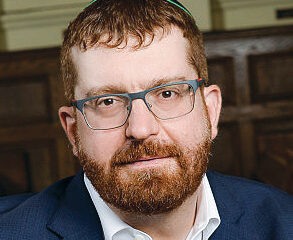Attitude of gratitude

By Rabbi Leibel Agar, Beth Jacob Congregation
As November rolls around, my thoughts turn to Thanksgiving. For many Americans, Thanksgiving is a chance to take a break from work or school and hang out with our families. We gather around the table and share a big dinner of turkey and stuffing, then top it all off with homemade apple and pumpkin pies for dessert.
Those of us who are football fans settle in on the couch to watch the Detroit Lions and Dallas Cowboys (the two teams who purchased exclusive rights from the NFL to play on Thanksgiving Day back when football was first televised). Some of us wake up early the next morning to take advantage of the Black Friday deals at our malls and department stores.
In my family, Thanksgiving was special because we usually had a huge family gathering; even my relatives from upstate Ohio would be there. Most of us, adults and children alike, would go outside to play the annual touch football “Thanksgiving Bowl” before dinner.
The meal was highlighted by the birthday celebration we would have for my brother (born on Thanksgiving Day). After dinner, the adults and older children settled down to play nickel-and-dime poker and the younger ones would entertain themselves channel surfing on Grandma’s TV. No matter what else was going on in our lives, we always had fun on Thanksgiving.
As a student of history, I’ve always found the origins of this holiday to be truly fascinating. Though most of us learned in school about how the Pilgrims and Native Americans made a big feast to show their gratitude after a particularly difficult winter, many people are unaware that the Thanksgiving feast did not originate at Plymouth Rock; it is really a tradition that goes back millennia!
As far back as biblical times, there are references to people making a Sudat Hodahah, a Meal of Thanksgiving as a way of thanking God for something. For example, the Kohen Gadol, High Priest, would host a Meal of Thanksgiving, for the entire city of Jerusalem on the day after Yom Kippur, as a way of thanking God for being able to enter and exit the Holy of Holies safely. There was even a special offering of Thanksgiving, the Korban Todah, which could be brought by someone wishing to thank God.
Unfortunately, the reasons behind Thanksgiving are often overlooked. Though the lack of the Holy Temple and the offering services conducted there certainly play a role, I believe there is a much greater reason as to why the religious connotations of Thanksgiving have faded — a simple lack of gratitude.
Sometimes people may see the things they have received as what they deserve rather than as a gift. Worse still, they may view these blessings as insufficient reward for what they have done; instead of appreciating the blessing, they complain and demand more.
Perhaps the holiday of Thanksgiving is meant to remind us to be grateful for that which we have and to always show the attitude of gratitude toward God and toward others.
To read the complete November 2024 Dayton Jewish Observer, click here.





